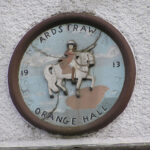18 April 1969: David Oluwale, a mentally ill Nigerian rough sleeper, drowns in the Aire while fleeing from two Leeds policemen who had beaten and abused him
Times. 1971/11/16. Witness Tells of Chase Near River Aire. London. Get it:
.Unedited excerpt
If an excerpt is used in the book, it will be shorter, edited and, where applicable, translated.
A former bus conductor said in evidence at Leeds Assizes yesterday that he did not see any wild animal behaviour [referring to Oluwale] as two policemen stood talking to a man near the river Aire. Mr David Condon said one of the men broke away and the other two gave chase. The distance he watched the chase was very short.
Mr Condon was giving evidence in the trial of a former police inspector, Geoffrey Ellerker, and Sergeant Kenneth Kitching, of Leeds police. They have denied the manslaughter of a Nigerian vagrant, David Oluwale, and various charges of causing actual and grievous bodily harm to him. The prosecution has alleged that they hounded and harassed Mr Oluwale until his death in the river Aire.
Mr Ellerker, aged 38, of Church Lane, Horsforth, Leeds, and Sergeant Kitching, aged 49, of Blakeney Grove, Hunslet, Leeds, are also separately charged with perjury.
Mr Gilbert Gray, QC, for the defence of Sergeant Kitching, asked Mr Condon: “If there had been any wild animal behaviour, such as lashing out and kicking from the man, you would have seen it?”
Mr Condon: “You would have seen it if you were looking.”
Mr Gray: “And similarly, if there had been any violence from the other two men you would have seen that?”
Mr Condon: “Yes.”
“And none of these things were present?”
“There was definitely no violence present.”
Mr George Merrion, of Oakley Terrace, Leeds, said he was in a bus when he saw two policemen hurrying towards the river. He asked the conductor what had happened and was told that the police had seen a man and were going to question him when he ran away down the alley to the river. The man jumped or dived into the river to get away.
Mr Gray asked: “Why was that day a memorable occasion for you?”
Mr Merrion replied: “The thing which made me recall the incident was that the conductor told me a man had jumped into the river. I was curious whether he had been able to swim to the other side and get out. I wondered whether it was possible for him to get out because of the high wall on the other side and because of the cold weather.”
Comment
Comment
Gary Galvin was the police cadet who in 1970 blew the whistle on his superiors. His son Carl Galvin, who is with West Yorkshire Police, spoke about him at a commemoration in 2019:
The events of 1969 had a profound effect on my father, a man who up until that point had been a team player with a wide circle of friends and involved in a lot of team sporting activities.
As a result of some of the reaction he got from colleagues and other people within society at that time, he became quite a solitary individual, but with that came a lot of strength because he would never ever let his morals and ethics waver and that is something he instilled in me and my brother as we were youngsters growing older.
He told me about this story in the last few months of his life, he was poorly in a hospice and he revealed to me a scrapbook that some of you may well have seen down at [a David Oluwale exhibition currently running at] the Tetley gallery.
He revealed that scrapbook to me of the memories he had kept and within it were lots of newspaper articles but also, and the thing that I picked out more, there were letters from all over the world praising him for his courage.
If you imagine in 1969 how difficult it must have been to try and track him and find somebody, he didn’t have an Instagram account, he had no Facebook ID, there was no e-mail, so some people literally wrote Gary Galvin West Yorkshire and posted their letter from as far away as Canada, Africa and many parts of the UK.
Yes, there were people within the police that hounded David, we can’t get away from that.
There were also people within the police who realised how bad that was and actually were pivotal in bringing [Kitching and Ellerker] to justice.
That’s the reason why I joined West Yorkshire Police, I joined West Yorkshire Police because, let me tell you, working with the 9,000 staff we have every single day, there are far more Gary Galvins in West Yorkshire Police than there are Kitchings and Ellerkers (Robinson 2019/04/20).
Something to say? Get in touch
Similar
 23 January 1643: Thomas Fairfax, the Rider of the White Horse, captures Leeds from the Beast with the help of Psalm 68
23 January 1643: Thomas Fairfax, the Rider of the White Horse, captures Leeds from the Beast with the help of Psalm 68 19 October 1816: Serenaded by the military, decorated barges leave Leeds for Liverpool to celebrate the completion, after almost 50 years, of the canal uniting east and west
19 October 1816: Serenaded by the military, decorated barges leave Leeds for Liverpool to celebrate the completion, after almost 50 years, of the canal uniting east and west 9 December 1932: The Jewish Chronicle mulls the Yorkshire Fascist Table Tennis Club’s decision to leave the Leeds league
9 December 1932: The Jewish Chronicle mulls the Yorkshire Fascist Table Tennis Club’s decision to leave the Leeds league
Comment
Comment
James Appell:
The wartime discord prompted some soul-searching within the community, which began questioning whether the economic and social bonds between Jew and non-Jew, forged in Leeds by the conditions of the tailoring trade, were really as strong as the trade unions and socialist movements might have portrayed. The Jewish Chronicle offered its own analysis just a few weeks after the Leeds riot concluded:
There has been a very large and sudden increase in the Jewish population of Leeds during the last few years, and that there has in consequence been considerable inconvenience in many directions to the indigenous inhabitants … Towns, like countries, can assimilate only a certain Jewish element in a certain time, and the Jewish addition to the population of Leeds has been too much and too fast.
The rapid entry of nearly 20,000 Jews into Leeds within the space of two generations clearly exerted pressures on the local population. In this respect Leeds may have differed from London and other provincial cities, where Jewish immigration from Eastern Europe was of a longer duration, where an Anglo-Jewish community already existed and where tensions were less marked than in Leeds. Poverty and mode of employment may have united the two groups, but ultimately religious difference divided them. In such circumstances, therefore, Leeds Jews’ identity as Yorkshiremen was only ever going to be fragile (Appell 2019).
Via Lola Fraser, who thinks the perception that Leeds’s (eastern European) Jews were evading military service would have been exacerbated by the Leeds socialist-pacifist convention on 3 June 1917 in support of revolutionary Russia’s withdrawal from World War I (Fraser N.d.).
Something to say? Get in touch
Search
Donate
Music & books
Place-People-Play: Childcare (and the Kazookestra) on the Headingley/Weetwood borders next to Meanwood Park.
Music from and about Yorkshire by Leeds's Singing Organ-Grinder.



 Bluesky
Bluesky Extwitter
Extwitter